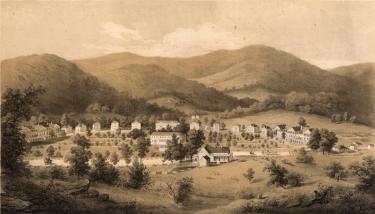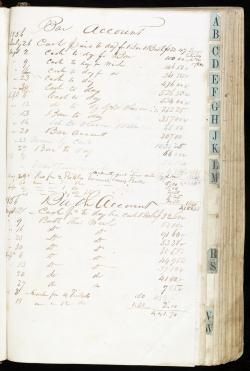Sweet Springs
Monroe County, West Virginia
They quicken the circulation, impart tonicity and vigor to the system, excite the animal passions, cheer the spirits, and inspire the mind with pleasureable sensations. William Burke

Edward Beyer’s print of Sweet Springs published in 1857. {1}
William Burke on the Sweet Springs.
The Sweet Springs, sometimes referred to as the Old Sweet Springs, are located in Monroe County in what is now West Virginia and are said to have been discovered in 1764 before other mineral waters of the area. Dr. Burke writes that Dr. Lewis who apparently owned the property at the time of the first edition of his book in 1842 had built a two story, brick house with an imposing appearance. This building, combined with a number of brick and framed cottages, provided accommodations for 350 people and were a major improvement over the earlier log cabins. However, by the time his second edition was printed, Dr. Burke was concerned that the death of Dr. Lewis had resulted in the estate being annually rented out to the highest bidder for the prior three years. He wrote, “The house remains in an unfinished state, and like all houses so left, without an owner, it is already evidencing dilapidation; and, should the decision of the questions now in litigation be delayed many years, its decay will be rapidly progressive.”
Burke’s Recommendations for Using the Waters at Sweet Springs.

Dr. Burke frowned upon the mixing of baths and spirits, but this account book shows that both bar and bath accounts were quite active in the summer of 1856. {2}
Since the waters at the Sweet Springs were highly stimulating, they were not recommended for cases of inflammatory disease or for those predisposed to tuberculosis and other lung related illness. People of sanguine temperament and women “in a delicate condition” or liable to severe periodical hemorrhages were discouraged from using the waters internally or by bathing. Dr. Burke strongly condemned the pernicious practice of imbibing “mint julaps” or other spirituous mixtures upon leaving the bath. But Dr. Burke asserted that aged persons, free from organic disease, would “find youth and vigor and elasticity at the bottom of this noble fountain,” and with a daily plunge could live to the “fabled age of the crow.” Burke also cautiously recommended the Sweet Springs for certain cases of uterine functions, dyspepsia, and nephritic affections.
Letter from Joseph C. Cabell to John Hartwell Cocke.
This letter {3} is corroborated by an American Beacon & Norfolk & Portsmouth Daily Advertiser newspaper notice: “Died at the Sweet Springs on Oct. 12, Miss Rebecca Parke Farley Carter, daughter of the late Dr. Charles & Mrs. Elizabeth L. Carter of Corrotoman, Lancaster Co., Va. Buried in Nelson Co. by her grandmother, the late Mrs. Judge Tucker, at Edgewood, the residence of her adopted parents, Mrs. Joseph C. & Mrs. Mary W. Cabell.” {Nelson County}

Edgewood. Oct. 18. 1839
My dear Cocke-
It has pleased Almighty God to take from us our dear beloved child. She expired at the Sweet Springs on the morning of the 12th. at 40 min. past one – & was interred along side of her Grandmother on the 15th at 3 in the evening. You can imagine, perhaps – the suffering of my poor wife & myself under this dreadful blow. Alas! My dear friend. we are broken hearted & desolate on the [earth]. I fear I shall hardly be able to support my poor wife, feeble as she already was, under this awful visitation.
Aff.ly yours-
Jos. C. Cabell
Thomas Jefferson Mentions the Sweet Springs, May 6, 1791.
-300x390.png)
At the end of his letter written in Philadelphia on May 6th, 1791, to Mr. Fulwar Skipwith, Thomas Jefferson adds a note about Mrs. Skipwith. Secretary of State at the time, Jefferson writes: I shall be happy to hear that Mrs. Skipwith’s stay at Richmond has bettered her health, & that the trip to the Sweet springs shall do it still more. I am sure her friends at Monticello will be made happy by seeing her there. would to God I could be of the party. it shall be so one of these days, without yet saying when. I would not give one hour of domestic & friendly society for an age of my present state. present me affectionately to Mrs. Skipwith & the young people, & accept assurances of the sincere esteem & attachment with which I am Dear Sir your sincere friend & servant
Thomas Jefferson
Mr Skipwith {4}
Documents from the Small Special Collections Library, University of Virginia:
- Ledger charges for Dr. Oliver Bierne, 1855: This page shows the cost for Dr. Bierne, his daughters, nieces, other ladies, horses, servants, champagne and two decks of cards.
- Hotel Register, August 23 and 24, 1872: The registry page show guests who came from as far away as Scotland.
Additional Information:
- National Register of Historic Places Nomination Form: This detailed form for the Sweet Springs was written after May 1982. It gives the history of the springs, a bibliography, maps, and photographs.
- National Register of Historic Places: The National Register has a brief summary of places in Monroe County, West Virginia.
- Monroe County Historical Society: The Society owns and seeks to restore the omnibus used to carry visitors from the Alleghany Railroad Station to Sweet Chalybeate (Red Sweet Springs) and Sweet Springs over 100 years ago.
- Sweet Springs Historic American Buildings Survey, National Park Service: Search for Sweet Springs, Monroe, WV, at this Web site, and see 13 photographs taken in 1974, one copy of a mid-19th century illustration, and another copy of a 1910 image.
- Monroe County official tourism site, culture and history: This site states that the resort was popular from the late 1700s to the early 1930s.
- Old Sweet Springs: View interior and exterior photographs.
- Sweet Springs Sanitarium: This sites shows the interior.
- Joseph C. Cabell: This site provides an image and information about Joseph Carrington Cabell whose adopted daughter died at Sweet Springs.
- Library of Congress Prints & Photographs Online Catalog: Search for Sweet Springs, and see 15 images of Sweet Springs and vicinity from before 1977.
- Thomas Jefferson’s Notes on the State of Virginia: In his section titled “Productions mineral, vegetable and animal,” Jefferson includes information about medicinal springs, one of which is Sweet Springs.
Image Credits:
- {1} Merritt T. Cooke Memorial Virginia Print Collection, 1857-1907, Accession #9408, Special Collections, University of Virginia Library.
- {2} Sweet Springs (West Virginia), Hotel Registers covering the years 1870-72, 1884-86, 1888, 1897, 1908, 2 volumes, Accession #421, Special Collections, University of Virginia Library.
- {3} Joseph Carrington Cabell Papers, 1790-1890, Accession #38-111-c, Special Collections, University of Virginia Library.
- {4} Papers of the Randolph family of Edgehill and Wilson Cary Nicholas, 1725-1826, Accession #5533, Special Collections, University of Virginia Library. 19th century copy.
Sources:
- William Burke, The Mineral Springs of Western Virginia, New York: Wiley and Putnam, 1846.
- Nelson County Obits and Marriage extracts copied from the “Henley Marriage & Obituary Index” From the marriage and obituary citations compiled by Bernard J. Henley from Virginia newspapers on microfilm at the Library of Virginia. Accessed online July 14, 2009.